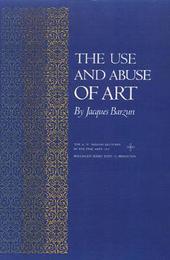
|
The Use and Abuse of Art
Paperback / softback
Main Details
| Title |
The Use and Abuse of Art
|
| Authors and Contributors |
By (author) Jacques Barzun
|
| Series | Bollingen Series |
|---|
| Physical Properties |
| Format:Paperback / softback | | Pages:160 | | Dimensions(mm): Height 229,Width 152 |
|
| Category/Genre | Theory of art |
|---|
| ISBN/Barcode |
9780691018041
|
| Classifications | Dewey:700 |
|---|
| Audience | | Professional & Vocational | | Tertiary Education (US: College) | |
|---|
|
Publishing Details |
| Publisher |
Princeton University Press
|
| Imprint |
Princeton University Press
|
| Publication Date |
21 June 1975 |
| Publication Country |
United States
|
Description
"When an extremely intellectual, extremely experienced, extremely wise man shares his thoughts with others, the result seizes the imagination at once. Such is the effect of these essays, a series given as lectures at the National Gallery in 1973. Mr. Barzun examines art as religion, as destroyer, as redeemer, and in relation to what he calls "its temper, science", but never forgets the basic essential. As he says, "the last word on art should indeed be: mystery. But that need not stop any of us from dealing with it as if we understood more than we can". And how good it is to have one's mind stretched to that understanding of "more.""--Virginia Quarterly Review
Author Biography
Jacques Barzun (1907-2012) was professor of history at Columbia University and the author of many books, including the bestselling From Dawn to Decadence: 500 Years of Western Cultural Life, 1500 to the Present; Simple and Direct; The Energies of Art; and The House of Intellect.
Reviews"When an extremely intellectual, extremely experienced, extremely wise man shares his thoughts with others, the result seizes the imagination at once. Such is the effect of these essays. . . . Barzun examines art as religion, as destroyer, as redeemer, and in relation to what he calls 'its tempter, science,' but never forgets the basic essential. As he says, 'the last word on art should indeed be: mystery. But that need not stop any of us from dealing with it as if we understood more than we can.' And how good it is to have one's mind stretched to that understanding of 'more.'" * Virginia Quarterly Review *
|